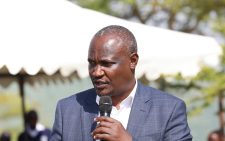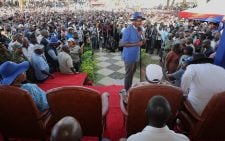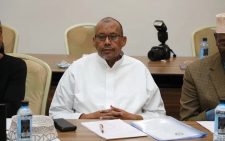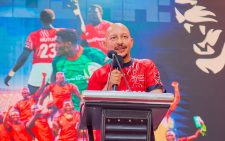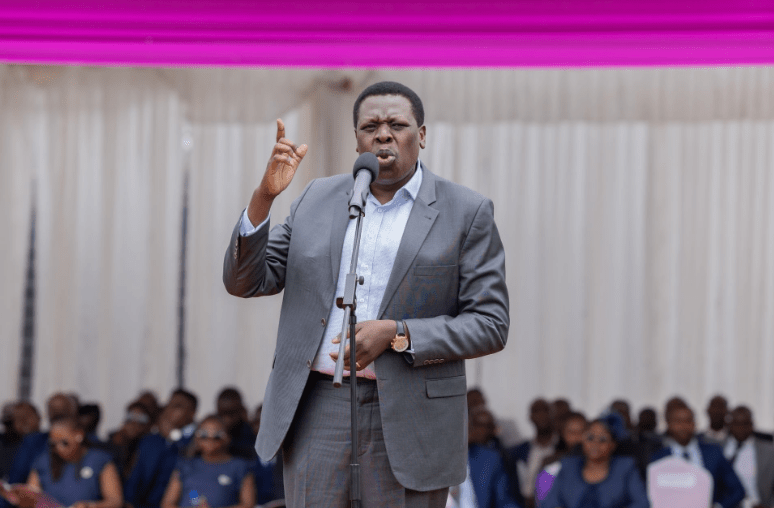Hope after despair for children with congenital heart diseases
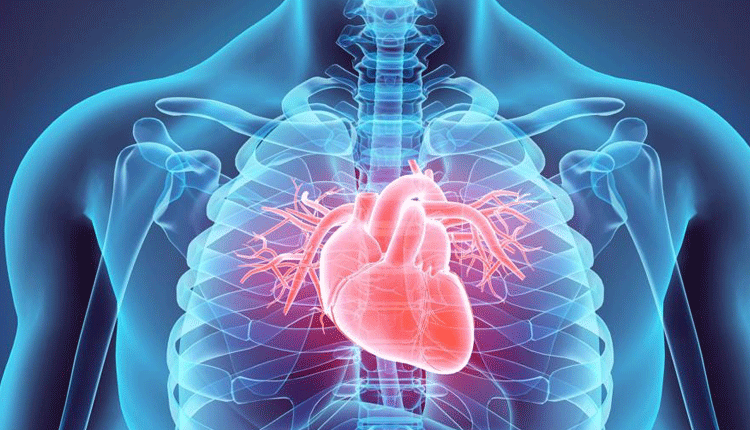
Nothing had prepared Ashley Maria for the shock of discovering that there was something wrong with her unborn baby’s heart. She was seven months pregnant when her doctor diagnosed her daughter Anne Staicy withTetralogy of Fallot (TOF), a combination of four related heart defects that commonly occur together.
As she narrates, the news of her daughter’s condition was followed by another devastating one, her daughter needed to undergo a surgery after birth to increase her chances of survival.
The remaining two months of Ashley’s pregnancy was clouded by fear and anxiety as she waited for the birth of her baby.
However, when the baby came, the doctor recommended that the surgery be done when she was at least six months old.
“The baby needed to put on weight before they could perform the surgery,” she explains.
At eight weeks old, when the baby, Anne Stacey was 2.7 kilogrammes went in for her first open heart surgery.
“Things didn’t go as planned as we would spend millions of shillings treating our daughter. There were multiple times the doctors prepared my husband and I for the worst. Anne was in the hospital’s Neonatal Intensive Care Unit (NICU) for two months after the surgery after which she was discharged and put under the care of a nurse and fed with the help of a tube,” Ashley narrates.
In the first two years of her life, Ashley always feared for how her daughter’s life would turn out. However, today, Anne is a thriving six-year-old and in kindergarten. She will be getting her first pulmonary valve transplant soon. “My daughter looks healthy and full of energy. You can hardly tell she has gone through such a difficult childhood, unless you see her scar or feeding tube,” Ashley says.
Hole in the heart
Sam Muoki was also born with an atrial septal defect (ASD), a congenital heart disease that refers to being born with a hole in the heart located between the upper chambers (atria). His father, John Mwangangi, says they noticed this when Sam was nine months old. “He had an abnormal growth where he couldn’t gain weight like a normal child. At first, we thought it was usual, but his heartbeat was too loud that we could hear it, he had difficulty breathing and would get tired when feeding. We made several visits to the clinic to establish what was wrong with him, only to be told that he had a hole in the heart,” says Mwangangi.
Mwangangi adds that the most difficult challenge was to raise funds to cater for the corrective surgery, to the tune of Sh1 million.
Ann and Sam are just a tiny bit of the number of children who are diagnosed with the different types of CHD every year. The World Health Organisation (WHO) reports that 5,000 children require CHD treatment in Kenya each year. A 2019 report by Frontiers in Paediatrics, an official journal of the European Academy of Paediatrics (EAP), indicated that on an annual basis, Kenya performs between120 and 150 congenital open-heart operations, with a similar number of congenital catheter interventions. The report also pointed out that approximately 50 to 100 additional patients receive treatment outside Kenya, most of whom are self-funded, but this does not include those with rheumatic heart disease, which accounts for a significant percentage in Kenya and Sub-Saharan Africa. The vast majority of these children receive suboptimal or no care at all.
Whilst the load of CHD is immense in Kenya, Gertrude’s Children’s Hospital recently initiated a free heart screening exercise through its foundation. According to the hospital, 79 children were found to require surgery, 25 of whom have been operated on so far while 28 children are on follow up and on medication.
Dr Carol Waweru, Gertrude’s Hospital Foundation manager says that the free heart screening campaign was inspired by the fact that most children with CHD are not correctly diagnosed. As a result, a majority of them end up leading a poor quality of life. They were also inspired by the increased cost of care delivery due to repeat hospitalisations. “The majority of the children that came when we were doing the heart screening programme already knew that they had a heart condition and wanted free heart surgery. One of the main contributors to poor access to cardiac surgery and associated care for children with CHD is inadequate diagnosis as a result of inadequate skills and technology to support the same across the country. Gertrude’s Children’s Hospital conducts periodic screening exercises to help diagnose these children in the local community and link them to definitive treatment,” says Carol.
“There are also inadequate specialist skills to provide surgical care to children with CHD. Cardiac surgery is the definitive treatment for CHD and often a majority of patients that receive the surgery get completely cured. Kenya has an inadequate number of specialists to provide paediatric cardiac surgery. While some patients travel abroad for cardiac surgery, for others, surgery is provided by specialists that fly into the country for “mission camps”. Gertrude’s Children’s Hospital has a team of specialists to conduct cardiac surgeries throughout the year,” she adds.
Inadequate financing to provide care to children with CHD has also been a hurdle.
Carol adds that even where surgery is available, the cost of such care is high and most families in Kenya cannot afford it. “Even those with private medical insurance, CHD is deemed pre-existing and, therefore, is not covered. We fundraise from donors to assist needy families that cannot afford heart surgery,” she says.
Dr Mark Awori, a children’s heart surgeon at Gertrude’s Children’s Hospital and a senior lecturer in the Department of Surgery, School of Medicine, University of Nairobi, says that cardiologists get frustrated in Kenya, because of lack of facilities offering open-heart surgeries. “That is the problem we are trying to adrress with Gertrude’s Hospital Foundation,” he starts.
Complex surgeries
Dr Awori says that while undertaking the screening, the most common case reported are, such as that of Sam —a hole in the heart.
In Kenya, specialists are pushing to develop capacity to treat complicated cases. “A third of the, holes in the heart cases are complex. Locally, we perform surgery on two-thirds of the cases. We want to move and do more complex surgeries,” he says.
“The most complex case in CHD is the one on single ventricles where half of the heart is not formed all together and one has only two valves. You can save these babies with early surgeries. They need very many surgeries even when they grow up. The results are worth it by the time they turn 10 to15 years,” he adds.
Prof Amal El Sisi, a cardiologist from Gift of Life International, which is affiliated with the Rotary that has clubs in Kenya are working with Gertrudes Children’s Hospital in handling such cases. “We are a team of 10 specialists in Kenya coming from Egypt. Our aim here in Kenya is to take part in a sustainable CHD programme,” she says, adding, “We are here to mentor Gertrude’s Children’s Hospital doctors who are very passionate and want to learn. Medicine is all about passion. You never get tired of it. It is like a hobby.”
Gift of Life International’s goal, she says is to develop sustainable paediatric cardiac programmes by implementing screening, surgical and training missions that are supported by autonomous Gift of Life programmes, Rotary Global Grants and generous donations from around the world.
High demand
Hesham Shawky, a professor of cardiac surgery since 1998, and the leader of the Gift of Life’s team currently in Kenya discourages patients from travelling abroad for treatment saying that it is important to develop a local programme that is sustainable. “In Kenya, the demand for paediatric cardiac surgeries is high. We only treat patients in their country. We discourage sending patients out of their countries to seek medical attention. That is the aim of Gift Of Life. It won’t help to do 20 surgeries in Kenya and then go away. Our aim is to mentor these cardiac specialists so that Kenya will do these things independently,” he says.
Shawky says that Kenya is in a better position to improv paediatric cardiac treatment compared to many developing countries they have worked in. Gertrudes has set a target of doing at least three paediatric cardiac surgeries in a week. “They have all it takes to reach their target of surgeries in a day. They have the supply, the manpower, the knowledge, machines, patients and the technique. We are just at the beginning of the race. We need more support from the government and community,” he says.
Treatment at home
For years, India has been the most preferred destination for surgery as Kenyans are driven by the stereotype that the local facilities are expensive. Dr Awori discourages this assumption asserting that in Kenya, their aim is to develop a world-class service at an affordable price. “In India, you will have problems with accommodation, air tickets, how to get a follow up, including appointments with the doctors. It is easier to be treated at home,” he states.
Dr Awori says that developing countries face the challenge of funding congenital heart surgeries. “We are looking at building the confidence of Kenyans with our facilities. The public will also help us by talking positively about our services as a country. Governments, corporations and individuals can help us reach this milestone,” he says.
Nonetheless, Dr Martin Mbiata notes that the intervention by the government bodies, such as the National Hospital Insurance Fund(NHIF) and non-governmental organisations has made treatment affordable. “NHIF has been in the picture as they give Sh500,000 on the surgery that normally costs Sh1.5 million. They cater for a-third of the cost. The rotary programme will also cater for one-third so you only look for the remaining Sh500,000 from friends and family,” he confides in conclusion.


